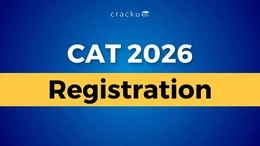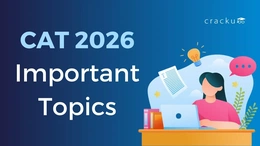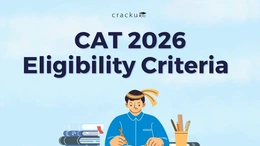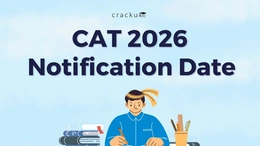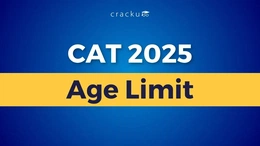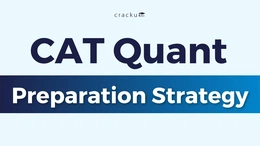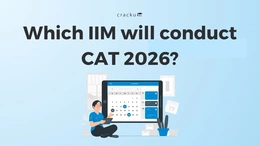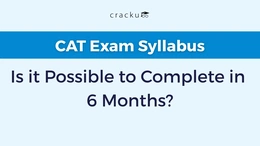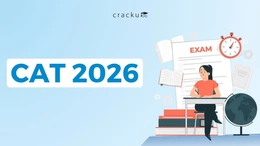CAT Exam Syllabus 2026
CAT 2026 syllabus covers three key sections: Verbal Ability and Reading Comprehension (VARC), Data Interpretation and Logical Reasoning (DILR), and Quantitative Aptitude (QA). Each section is designed to test specific skills, and candidates need to focus on building their strengths across all areas to perform well. The syllabus is structured to ensure that candidates are evaluated on a wide range of skills, including language comprehension, analytical reasoning, and mathematical ability. Understanding the detailed syllabus and preparing accordingly will give you a clear edge in the exam.
CAT Exam Syllabus PDF
CAT Exam Syllabus PDF provides a detailed breakdown of the subjects and topics included in the CAT exam, helping aspirants understand what to study in Quantitative Ability, Verbal Ability & Reading Comprehension, and Data Interpretation & Logical Reasoning.
CAT Exam Syllabus 2026: Overview
CAT 2026 exam is divided into three sections: Verbal Ability and Reading Comprehension (VARC), Data Interpretation and Logical Reasoning (DILR), and Quantitative Aptitude (QA). Each section has a 40-minute time limit. Here’s an overview of the CAT Exam Syllabus 2026:
Section | Number of Questions | Time Allotted | Weightage |
Verbal Ability and Reading Comprehension (VARC) | 24 | 40 minutes | 36% |
Data Interpretation and Logical Reasoning (DILR) | 22 | 40 minutes | 32% |
Quantitative Aptitude (QA) | 22 | 40 minutes | 32% |
Total | 68 | 120 minutes | 100% |
Also Read, CAT Registration 2026, Important Dates, Eligibility, Form Fees
CAT Exam Pattern and Syllabus
CAT 2026 exam will be conducted in a computer-based format, and the medium of instruction will be English. The total duration of the exam is 120 minutes, with a 40-minute time limit for each of the three sections. The exam consists of 68 questions in total, with a maximum of 204 marks.
The questions are divided into three sections: Verbal Ability & Reading Comprehension (VARC), Data Interpretation & Logical Reasoning (DILR), and Quantitative Ability (QA). The exam will feature both Multiple Choice Questions (MCQs) and Type In The Answer (TITA) questions. The marking scheme awards +3 marks for correct answers, -1 for incorrect MCQs, and there is no negative marking for TITA questions. The CAT 2026 exam will be held in three slots: Morning, Afternoon, and Evening. The key details of the CAT Exam Pattern and Syllabus is as follows:
Feature | Details |
Mode of Exam | Computer-Based Test (CBT) |
Medium of Exam | English |
Total Duration | 120 minutes (2 hours) |
Number of Sections | 3 |
Sectional Time Limit | 40 minutes per section |
Total Questions | 68 |
Total Marks | 204 |
Sections | Verbal Ability & Reading Comprehension (VARC) – 24 questions (72 marks) |
Data Interpretation & Logical Reasoning (DILR) – 22 questions (66 marks) | |
Quantitative Ability (QA) – 22 questions (66 marks) | |
Question Types | Multiple Choice Questions (MCQs) and Type In The Answer (TITA) |
Marking Scheme | +3 for correct answer; -1 for incorrect MCQ; No negative marking for TITA |
Exam Slots | 3 slots (Morning, Afternoon, Evening) |
Also Read, CAT 2026, Important Dates, Application Form, Eligibility Criteria
What is the CAT Exam Syllabus for MBA?
CAT exam syllabus for MBA includes three main sections: Quantitative Ability, Verbal Ability & Reading Comprehension, and Data Interpretation & Logical Reasoning. It outlines the key topics candidates need to prepare for admission to top management institutes in India.
Also Read, CAT Marking Scheme 2026, Weightage, Negative Marking
CAT Section Wise Syllabus 2026
CAT Exam Section Wise Syllabus provides a clear outline of the key topics to focus on for each section of the exam. For Verbal Ability & Reading Comprehension (VARC), candidates need to prepare for reading comprehension, para jumbles, sentence correction, and vocabulary-based questions. The Data Interpretation & Logical Reasoning (DILR) section covers topics like data interpretation, logical puzzles, and reasoning through tables and graphs. The Quantitative Ability (QA) section includes areas such as arithmetic, algebra, geometry, and number systems. This section-wise breakdown helps candidates organize their study plan effectively.
Also Read, CAT Notification 2026, Release Date, Download PDF Link
CAT VARC Syllabus 2026
VARC is the first section of the CAT exam and must be attempted first. It is divided into two sub-parts – Verbal Ability (VA) and Reading Comprehension (RC). The sectional time limit for the VARC section is 40 minutes. The detailed CAT 2026 syllabus for Verbal Ability and Reading Comprehension (VARC) is outlined below:
Section | Topics |
Verbal Ability (VA) | Para Jumble, Para Completion & Inference, Sentence Completion, Fill in the Blanks, Verbal Reasoning, critical reasoning. |
Reading Comprehension (RC) | Fact, Inference, Judgment, Reading Comprehension Passages (from varied topics like literature, science, economics, and philosophy) |
Also Check, CAT 2025 Syllabus PDF, Download Section-wise Syllabus PDF
CAT DILR Syllabus 2026
DILR is the second section of the CAT exam which has to be solved after the VARC section. This section is divided into two parts – Data Interpretation (DI) and Logical Reasoning (LR). The sectional time limit for this section is 40 minutes. Candidates can find the detailed CAT syllabus 2026 for DI & LR below:
Section | Topics |
Data Interpretation | Bar Graph, Line Graph, Pie Chart, Tables, Caselet, Combination of Graphs, Special Charts, Data change over a period etc. |
Logical Reasoning | Seating Arrangement, Venn Diagram, Constraint-based Puzzles, Matching Puzzles, Data Arrangement Sets, Games and Tournaments, Truth and Lie, Selection with Conditions, Quant based LR, Scheduling, Table with missing Values etc. |
CAT Quant Syllabus 2026
QA is the last section in the CAT question paper and the sectional time limit for this is 40 minutes. Take a look at some of the important topics from the CAT 2026 QA section:
CAT Arithmetic Syllabus
Sub-Topic | Description / Concepts Covered |
Ratio & Proportion | Simple, Compound, Continued Ratio |
Percentage | Successive Percentage Changes, Profit & Loss, Discounts |
Average | Weighted Average, Combined Average |
Time & Work | Work Efficiency, Pipes and Cisterns |
Time, Speed & Distance | Relative Speed, Trains, Boats and Streams |
Simple & Compound Interest | Installments, Effective Rate |
Mixtures & Allegations | Mixture of 2 and 3 solutions |
CAT Algebra Syllabus
Sub-Topic | Description / Concepts Covered |
Linear Equations | Single and Multi-variable equations |
Quadratic Equations | Roots, Nature of Roots, Formation of Equation |
Polynomials | Remainder Theorem, Factor Theorem |
Inequalities | Linear and Quadratic Inequalities, Modulus Inequalities |
| Logs, Surds and Indices | logarithm identities, exponents |
Functions | Domain, Range, Graphs, Composition, Inverse |
CAT Geometry Syllabus
Sub-Topic | Description / Concepts Covered |
Lines and Angles | Parallel Lines, Angles |
Triangles | Types, Congruence, Similarity, Pythagoras, Inequality |
Quadrilaterals | Parallelogram, Rectangle, Rhombus, Trapezium |
Circles | Tangents, Chords, Arcs, Angles in Circle |
Polygons | Interior & Exterior Angles |
Coordinate Geometry | Distance Formula, Section Formula, Area, Locus |
Mensuration | Areas and Volumes of several 2D and 3D figures, such as triangles, rectangles, polygons, circles, and cones. |
CAT Modern Maths
Sub-Topic | Description / Concepts Covered |
Number System | Remainders, factorial, Euler’s function |
| LCM and HCF | Prime Factorization, Applications in Word Problems |
Sequence and Series | AP, GP, HP and AGP concepts |
Permutation and Combination | Selection and arrangement concept |
Probability | Baye’s Theorem, Coins and Dices |
CAT Syllabus 2026: Preparation Strategy
To prepare well for CAT 2026, it's important to understand the exam structure, practice regularly, and follow a clear study plan. A smart preparation strategy helps you use your time wisely, work on your weaker sections, and feel confident when taking the exam. Here's how you can plan your preparation step by step.
What to Know About the CAT 2026 Exam?
The Common Admission Test (CAT) 2026 is expected to be conducted on the last Sunday of November 2026, as per trends from previous years. The exam is held in a computer-based format and consists of three sections: Verbal Ability and Reading Comprehension (VARC), Data Interpretation and Logical Reasoning (DILR), and Quantitative Ability (QA). Each section is allotted 40 minutes, and the entire test lasts for two hours. The marking scheme awards +3 for each correct answer and imposes a -1 penalty for wrong answers in MCQs, while there is no negative marking for TITA (Type In The Answer) questions.
Start by Learning the Syllabus and Basics
To begin preparation, aspirants should first understand the exam structure and syllabus by visiting the official CAT website, iimcat.ac.in. The first phase of preparation, ideally spanning the first two months, should focus on building conceptual clarity across all three sections. Make sure you use CAT study material efficiently, where you can find alot of free material to build basics.
How to Prepare for Quant Section?
For the Quantitative Ability section, candidates must strengthen their basics in arithmetic, algebra, geometry, number systems, and modern mathematics. Regular practice and solving a variety of problems from each topic will help improve accuracy and speed. CAT Daily Target is an excellent source to ace this section.
How to Prepare for Verbal and Reading Section?
In the Verbal Ability and Reading Comprehension section, reading newspapers, journals, and books is highly recommended to improve comprehension skills and vocabulary. Practicing different types of verbal questions such as para jumbles and sentence completion will help in mastering this section. To ace this section aspirants need to develop reading habit. Students can read a variety of online articles from CAT Daily Articles.
How to Prepare for the DILR Section?
For the Data Interpretation and Logical Reasoning section, aspirants must focus on interpreting complex data sets and solving logical puzzles. Practising with time-bound sets is crucial, as this section requires quick thinking and accuracy under time pressure. CAT Previous Papers are an excellent source to start your LRDI preparation. You will get a fair understanding of the kind of sets that comes in CAT exam.
Next Step: Take Small Tests and Find Weak Areas
From the third to fourth month, students should begin attempting sectional tests to assess their understanding and identify weak areas. Always remember that consistency is one of the most important factor when it comes preparing effectively for the CAT exam.
Practice Full Mock Tests and Improve Strategy
In the fifth and sixth months, full-length mock tests should be taken regularly, followed by a detailed analysis of performance. This phase is essential to fine-tune strategies and manage time effectively.
Last Month: Focus on Revision and Staying Calm
In the final month, the focus should shift to revision, confidence building, and stress management. Candidates should continue practising mocks but with greater emphasis on minimising errors and maximising scores in their stronger sections.
Keep Checking Updates and Learn from Mock Tests
Additionally, staying updated with any notifications or changes in the exam structure through the official CAT portal is vital. Aiming for 30 to 40 mock tests before the actual exam and analyzing them thoroughly will help refine your approach.
Also Read, Cracku's CAT 2026 Course by 5-time 100%iler
CAT Exam Syllabus 2026: Conclusion
Understanding and preparing for the CAT Exam Syllabus 2026 is the first big step toward getting into a top MBA college. The exam includes three main parts: Verbal Ability and Reading Comprehension (VARC), Data Interpretation and Logical Reasoning (DILR), and Quantitative Aptitude (QA). To do well, you need to start by knowing all the topics clearly. Focus on building your basics in each section and solve many practice questions to improve your speed and accuracy. Make sure you read regularly, practice puzzles, and solve math problems every day.
Along with studying, it’s important to take mock tests and analyze your performance. These tests will help you find your weak areas and improve your time management. Don’t forget to stay updated with any changes in the exam structure on the official CAT website. If you stay consistent, follow a daily study plan, and keep revising smartly, you can confidently aim for a top score in CAT 2026. Keep your preparation strong, stay focused, and success will follow.
 Group
Group













